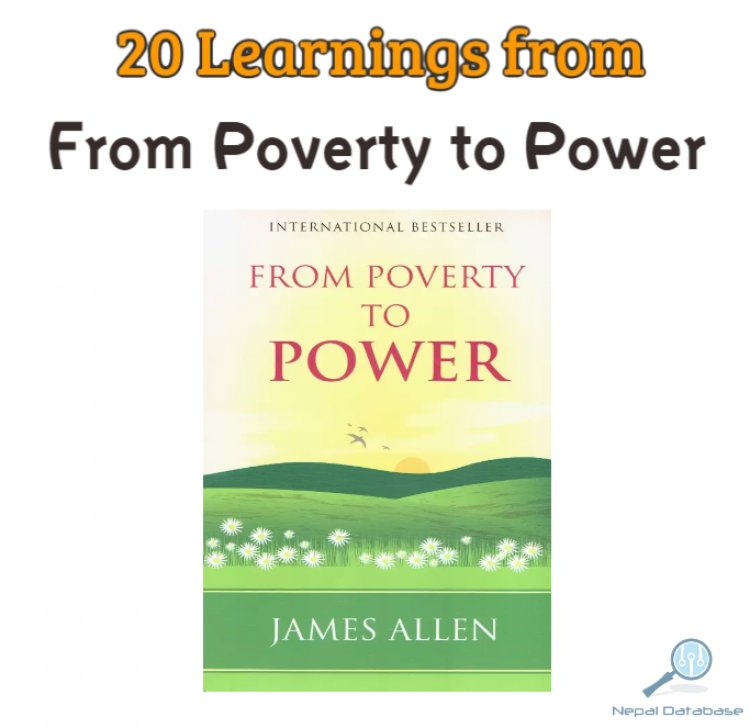20 Key Takeaways from "From Poverty to Power" - Unlocking the Secrets of Economic Development
Discover the essential takeaways from "From Poverty to Power" by Duncan Green, including perspectives on global poverty, inequality, and sustainable development.

"From Poverty to Power: How Active Citizens and Effective States Can Change the World" is a book written by Duncan Green, a senior strategic advisor at Oxfam GB. The book is a comprehensive guide to understanding and addressing poverty and inequality. It provides an in-depth analysis of the causes of poverty and suggests ways in which individuals and governments can work together to reduce poverty and create more equitable societies. The book draws on a wealth of research and real-world examples to provide a clear and practical guide for anyone interested in understanding and addressing poverty and inequality.
-
The importance of active citizens
Green emphasizes the role of active citizens in creating change. He argues that citizens who are engaged and informed about issues related to poverty and inequality are better equipped to hold their governments accountable and demand policies that promote development. -
The role of government
Green also stresses the importance of effective states in reducing poverty. He argues that governments have a crucial role to play in creating the conditions necessary for sustainable development, such as investing in education and healthcare and implementing policies that address inequality. -
The need for a long-term approach
Green argues that addressing poverty and inequality is a long-term process and that short-term solutions will not be effective. He suggests that a long-term approach that addresses the root causes of poverty, such as inequality and injustice, is necessary for sustainable development. -
Importance of addressing inequality
Green suggests that addressing inequality is crucial for reducing poverty. He argues that inequality not only limits the opportunities of the poor but also undermines the social and economic fabric of society. -
The need for a holistic approach
Green suggests that a holistic approach to development is necessary. He argues that addressing poverty and inequality requires a multifaceted approach that addresses issues such as economic development, political empowerment, and environmental sustainability. -
The importance of empowering the poor
Green emphasizes the importance of empowering the poor. He argues that empowering the poor means giving them the tools and resources they need to improve their lives, such as access to education and healthcare. -
The need for international cooperation
Green argues that international cooperation is necessary for addressing global poverty and inequality. He suggests that countries need to work together to address issues such as climate change and economic inequality, which have global implications. -
The role of civil society
Green suggests that civil society organizations have a crucial role to play in addressing poverty and inequality. He argues that civil society organizations can provide a voice for the poor, hold governments accountable, and provide services to marginalized communities. -
The need for transparency
Green argues that transparency is necessary for effective development. He suggests that governments and organizations need to be transparent about their policies and actions in order to build trust and accountability. -
The importance of data
Green emphasizes the importance of data in addressing poverty and inequality. He argues that data can help identify the needs of marginalized communities, track progress, and hold governments accountable. -
The need for flexible and adaptive policies
Green suggests that development policies need to be flexible and adaptive in order to be effective. He argues that policies need to take into account the unique needs and circumstances of different communities and be able to adapt to changing conditions. -
The importance of human rights
Green argues that human rights are essential for sustainable development. He suggests that protecting human rights, such as the right to education and healthcare, is necessary for reducing poverty and inequality. -
The role of the private sector
Green suggests that the private sector has a crucial role to play in addressing poverty and inequality. He argues that businesses can create jobs, invest in communities, and provide goods and services to the poor. -
The need for sustainable development
Green argues that sustainable development is necessary for addressing poverty and inequality in the long term. He suggests that development needs to be environmentally sustainable and promote economic growth that benefits all members of society. -
The importance of participatory development
Green suggests that participatory development is necessary for achieving sustainable development. He argues that development needs to be planned and implemented with the participation of the communities it aims to serve. -
The need for a rights-based approach
Green argues that a rights-based approach is necessary for addressing poverty and inequality. He suggests that development policies and programs should be based on the principles of human rights and should protect the rights of the poor and marginalized communities. -
The importance of addressing environmental issues
Green argues that addressing environmental issues is crucial for reducing poverty and promoting sustainable development. He suggests that issues such as climate change, deforestation, and pollution have a direct impact on the lives and livelihoods of the poor and need to be addressed. -
The role of social movements
Green suggests that social movements have an important role to play in addressing poverty and inequality. He argues that social movements can bring attention to issues, mobilize communities, and pressure governments and institutions to take action. -
The need for inclusive development
Green argues that inclusive development is necessary for addressing poverty and inequality. He suggests that development policies and programs should be inclusive of marginalized groups such as women, ethnic minorities, and people with disabilities. -
The importance of monitoring and evaluation
Green emphasizes the importance of monitoring and evaluation in development. He suggests that monitoring and evaluation can help track progress, identify successes and challenges, and make adjustments to development policies and programs as needed.
In the conclusion of "From Poverty to Power," Green reiterates the importance of active citizens and effective states in addressing poverty and inequality. He argues that a combination of grassroots activism and government action is necessary to bring about real change and that addressing issues such as inequality, injustice, and environmental degradation is essential for reducing poverty in the long term. Additionally, he emphasizes the importance of a holistic approach, transparency, data, and monitoring and evaluation in sustainable development. He concludes by stating that addressing poverty and inequality is a complex and challenging task, but one that is essential for creating a more just and equitable world. The book serves as a call to action for individuals, governments, and organizations to work together to address poverty and create a better future for all.
What's Your Reaction?








































































































